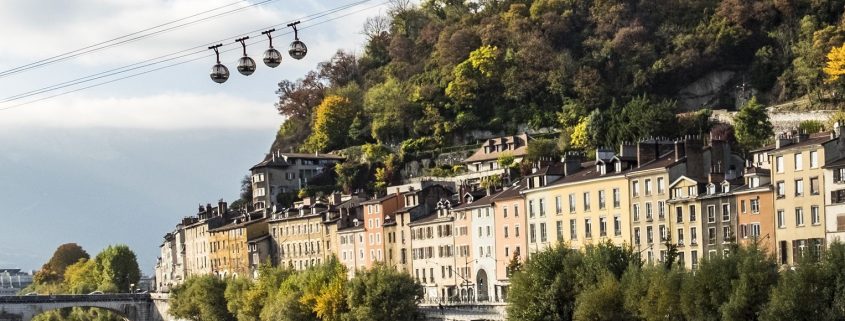Welcome to the first part of our interview series providing insight into PR trends and local differences in PR practices from more than 20 countries*. Learn why you have to think French in order to do successful PR in France, how to get time challenged journalists to take time for a product launch event and become aware of the difference in Northern and Southern European punctuality in today’s interview with French PR expert Sandra Labérenne.
* The series is based on phone or face-to-face interviews and written input, therefore please excuse language mistakes which might reflect foreign language influences.
1. What is the latest trend (change) in PR you have identified in your region?
Sandra Labérenne: France is one of the leading European countries in regard to blogging. Therefore it comes as no surprise that Blogger relations, Online PR and Social Media are very important for our local market and nowadays nearly all customers ask for social media support. Although the programs are a bit more developed and pro-active in the B2C markets and more responsive in the B2B markets.
We have discovered that the web 2.0 is changing the way of doing PR. Blogger relations are for example very different from media relations.
2. How does your agency handle / embrace this?
Sandra Labérenne: In France we work especially with bloggers. We search for the most followed ones and are focused on finding trendsetters. We also consider it very important to build up a good relationship to those bloggers we have in our blogging program. This means we try to meet them and talk to them in person, not only via mail or phone contact.
Regarding the difference between blogger and media relations: for example the material you provide to bloggers has to be much more tailored to their individual interests and to their specific blog than material you send out to the press.
We also use video material to support campaigns on channels such as Dailymotion and Social Media channels such as Facebook. These examples have been used in a UNESCO PR campaign supporting the avant-première of a film called “Nous resterons sur Terre”.
3. Can you give us a recent example from a project?
Sandra Labérenne: We recently had a campaign for a company introducing their electric bicycles. The campaign appealed to the people to leave their car at home and use the bicycle instead, when wanting to drive only a few kilometres. Especially in Paris people seem to drive every short distance by car which results in a heavy traffic – you could even be faster by bike, especially with one which you can use as a normal bike but switch on a motor for support if you are tired or need to go extra fast.
For implementing this campaign we organized exhibitions and events supported by a Social Media campaign. We created a facebook fanpage and we fed videos to Dailymotion, the most popular video portal in France, regularly. We even had a contest between editors of several magazines. They tested the cycles and had a race, and the winner was allowed to keep his bike.
4. Are there any PR practices in which you think your region differs from PR in other part of the world?
Sandra Labérenne: As some of you might have experienced – either in their work relations or even during journeys to France – the French are very self centered. It starts with most French people’s relation to foreign languages but also influences other elements of PR practices. For example, French journalists are only interested in local case studies, local client announcements and news on the activities of the client’s company in France.
Unlike many other countries our press also still prefers face to face press meetings – instead of phone interviews which are much more popular in the USA and the UK for example. As the media business is very much centralized and concentrated in Paris, press meetings are also easier to organize than e.g. in Germany where editors could be based in Munich, Frankfurt, Berlin, Hamburg. Most of our journalists also only trust French company spokes persons.
5. Can you describe common mistakes foreign companies make?
Sandra Labérenne: The French media are really allergic to the typical international Marketing phrases. For example every company seems to position itself as “the leader” in their market.
Also most companies send over an international Marketing Manager or somebody from the general Management team, who then presents the big global picture and the global strategy of the company. But these people tend not to have enough local insight into the French market and the activities of their company in France, and as mentioned before, besides a very short summary of the overall picture, the French press will be nearly exclusively focused on the news and information related to France. It is therefore essential to include a local French spokes person into the interview.
Due to the language issue we also have to make sure press material is always available in French. This is essential as companies otherwise risk none of the editors will read or use the material. Local public relations firms know this very well.
6. What do clients from other markets need to keep in mind when they plan to do PR in your region?
Sandra Labérenne: Think French – or if you can’t, pick the brain of a French colleague or PR consultant!
No, seriously: foreign companies, especially those from the USA, still think of Europe as one region and don’t take into account how different the cultures in Europe can be, and how much impact this has on PR services.
Besides the language issue and other practices described above this also concerns cultural aspects such as punctuality or reliability regarding press meetings or calls. The Southern European understanding of punctuality, e.g. for a meeting – simply differs from that of Northern Europe. If a meeting at a trade fair was confirmed for 2:30, for most French people 2:55 is still nearly on time.
In order to make sure editors will show up at confirmed meetings we call them and send reminders a day before the meeting or even again on the day of the meeting, which would probably be considered a bit over the top in other regions.
On the bright side, we can still arrange lunch meetings with editors who then take their time to really get to know company representatives by combining their lunch break with a business meeting, while in other regions editors might not be able to invest more time than a short phone briefing. And what better place can there be than Paris to enjoy a nice lunch?
***
Read more about regional differences in PR and why knowing these are crucial to successful international public relations – but also why companies can save themselves a lot of nerves and trouble by inviting French journalists to lunch meetings with excellent French food instead of forcing them to participate in phone conferences – in part 2 of the interview with our French PR expert Sandra Labérenne next week.
—————————————————————————————————————————————–
Created in 1989, Point Virgule became one of the most important independent French PR agencies. For more than 19 years, Point Virgule has been helping hundreds of clients to build and improve their image and brand awareness and to become market references in the mind of journalists and potential customers. Among the clients Point Virgule works for are companies like Yingli Green Energy, Dimension Data, Akamai, LSI Logic, Alatavia, Fullsix Group, etc.


